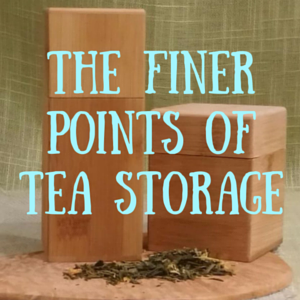
We get a lot of questions in our shop about tea storage. People want to know, when they buy in bulk, or if they don’t drink tea all that often, how long their tea will stay fresh for, and what happens to old tea. Here at Good Life Tea, we thought we’d make a master list of all of the major questions we get regarding the storage of your tea.
Will my tea go bad?
Unless your tea gets wet in some way (moisture is the enemy of tea), it will not go bad. You will never open an old box at the back of your cupboard to find a horrible rotten mess that will haunt your dreams years later. Instead, tea slowly loses its taste and goes stale over time. Generally, stale tea is still totally drinkable, and you can compensate for a certain amount of staleness by simply using more tea. Tea, with the exception of Pu’ehrs, which age like wine, age like potpourri. With time, they fade.
How long will my tea stay fresh for?
 This question has a lot of variables. It really depends on the type of tea, and how it is stored. In the bags that our tea comes in, your tea will generally be fine for 2-3 months. Properly stored tea can last much longer, which is why we offer a broad variety of tins and canisters.
This question has a lot of variables. It really depends on the type of tea, and how it is stored. In the bags that our tea comes in, your tea will generally be fine for 2-3 months. Properly stored tea can last much longer, which is why we offer a broad variety of tins and canisters.

The longevity of properly stored teas vary mainly by their type. Green and white teas are fragile, and will generally start to lose their flavor after six months to a
year. Oolongs are a little tougher, as they are in between green and
black. Black teas are hardy. Black teas, if properly stored, will stay fresh for at least a year, but can easily survive for two, three, or more. This is why black teas were traded to the English from China. They had the ability to survive long journeys, and still come out fresh.
How do I keep my teas fresh longer?
Your tea can be stored for longer by keeping it away from the five things which degrade tea:
Air-
 Keep your tea in an air-tight container. Doing so keeps the smell and flavor of other nearby items out, and the smell and flavor of your tea in. In the shop, we store our tea in large, glass jars, sealed with a ring of rubber around the top, and held closed with heavy metal clasps. While you may not have jars like this, mason jars can keep your tea away from the air, as can our tea tins, and more attractive canisters with sealed tops.
Keep your tea in an air-tight container. Doing so keeps the smell and flavor of other nearby items out, and the smell and flavor of your tea in. In the shop, we store our tea in large, glass jars, sealed with a ring of rubber around the top, and held closed with heavy metal clasps. While you may not have jars like this, mason jars can keep your tea away from the air, as can our tea tins, and more attractive canisters with sealed tops.
Light-
Light will bleach the flavor, color, and aroma out of your tea. In our shop, we walk a careful line between properly displaying our teas and keeping them away from the light. We display them in glass jars, but keep them as far from the window as we can. We can get away with it because our teas move through our jars much faster than they would move through the private stash o f an individual tea drinker.
f an individual tea drinker.
While mason jars are a great way to keep your tea away from the air, they will allow in light, unless you’re storing them inside of a cupboard. Both our tins, and our nicer looking canisters, are excellent ways to keep the light away from your tea.
Heat-
Keeping your tea by the stove, or in a windowsill is somewhat inadvisable. Heat, if your recall a little chemistry, speeds up chemical reactions, such as those slowly ruining the flavor of an older tea. We keep the shop well air-conditioned in the summer, and like the say that it is clearly for the benefit of the teas, and not ourselves.
Odor-

Moisture-
 As we’ve mentioned before, a dry tea will not rot. Water is the worst possible thing for keeping your teas fresh. We recommend that you never keep loose teas in the fridge. This is partially because of the fact that refrigerators smell like food, partially because they don’t need it, and partially because the cold can cause moisture to condense on the containers, which may get in when they are opened. We also don’t recommend keeping your teas in a damp basement.
As we’ve mentioned before, a dry tea will not rot. Water is the worst possible thing for keeping your teas fresh. We recommend that you never keep loose teas in the fridge. This is partially because of the fact that refrigerators smell like food, partially because they don’t need it, and partially because the cold can cause moisture to condense on the containers, which may get in when they are opened. We also don’t recommend keeping your teas in a damp basement.
We hope that this guide has helped, and we hope that your teas last for as long as they possibly can!
